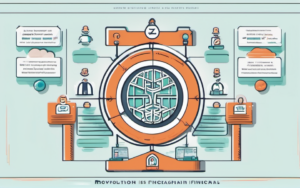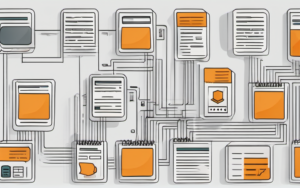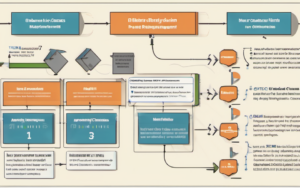The Internet of Things (IoT) is rapidly transforming the way we live, work, and interact with the world around us. From smart homes and wearable devices to connected cars and industrial automation, IoT is creating a network of interconnected devices that collect, share, and analyze data in real-time. But as the IoT ecosystem expands, so do concerns about security, privacy, and data management. This is where blockchain technology enters the picture, offering a revolutionary solution to address these challenges.
The Convergence of Blockchain and IoT
The Internet of Things (IoT)
The IoT refers to the network of physical devices, vehicles, home appliances, and other items embedded with electronics, software, sensors, actuators, and connectivity, enabling these objects to collect and exchange data. This data exchange allows for greater automation, efficiency, and insights, leading to transformative applications across various industries.
Blockchain Technology: A Primer
Blockchain is a decentralized, distributed ledger technology that records transactions securely and transparently. Each block in the chain contains a timestamp, transaction data, and a hash of the previous block, creating an immutable and auditable record. This tamper-proof nature makes blockchain a highly secure and reliable platform for storing and managing data.
The Intersection of IoT and Blockchain
The intersection of IoT and blockchain creates a powerful synergy, leveraging the strengths of both technologies to address the challenges and unlock the full potential of the IoT ecosystem. Blockchain can provide the secure, transparent, and decentralized infrastructure needed to manage the vast amount of data generated by interconnected devices.
Key Benefits of Blockchain for IoT
Enhanced Security and Trust
One of the most significant benefits of blockchain for IoT is its ability to enhance security and trust. By leveraging cryptography and distributed consensus mechanisms, blockchain can secure data transmission, prevent unauthorized access, and ensure data integrity. This is crucial for protecting sensitive information and ensuring the reliability of IoT devices.
Improved Data Management and Privacy
Blockchain can revolutionize data management in the IoT by providing a decentralized and transparent platform for storing and accessing data. This allows for greater control over data ownership and usage, empowering users to manage their data securely and privately. Blockchain can also facilitate data sharing and collaboration while maintaining data integrity and privacy.
Streamlined Supply Chain Operations
Blockchain can streamline supply chain operations by providing real-time visibility into product movement, origin, and authenticity. This can reduce fraud, improve efficiency, and optimize inventory management. Blockchain can also enable secure and transparent transactions between supply chain partners, fostering trust and collaboration.
Facilitating Decentralized Governance
Blockchain can empower users and stakeholders by facilitating decentralized governance in the IoT. This means that decision-making processes can be more inclusive, transparent, and accountable. Blockchain can also enable the development of decentralized applications (dApps) that can automate tasks, manage resources, and enhance the overall efficiency of IoT systems.
Real-World Applications of Blockchain in IoT
Smart Cities and Infrastructure
Blockchain can play a crucial role in building smarter and more sustainable cities. It can be used to manage energy grids, optimize traffic flow, monitor environmental conditions, and improve public safety. For example, blockchain can enable secure and transparent payment systems for public transportation, facilitate the sharing of data between city departments, and empower citizens to participate in decision-making processes.
Healthcare and Medical Devices
Blockchain can revolutionize healthcare by improving patient data management, enhancing medical device security, and streamlining supply chain operations. It can be used to securely store patient medical records, enable secure and efficient data sharing between healthcare providers, and track the provenance of medical supplies and devices.
Supply Chain Management and Logistics
Blockchain can transform supply chain management by providing real-time visibility into product movement, origin, and authenticity. This can reduce fraud, improve efficiency, and optimize inventory management. Blockchain can also enable secure and transparent transactions between supply chain partners, fostering trust and collaboration.
Energy and Utilities
Blockchain can enhance energy efficiency and security by enabling peer-to-peer energy trading, managing smart grids, and tracking energy consumption. It can also be used to facilitate renewable energy projects, optimize energy distribution, and promote sustainable energy practices.
Challenges and Considerations
Scalability and Performance
One of the key challenges facing blockchain adoption in IoT is scalability and performance. The current state of blockchain technology may not be able to handle the vast amount of data generated by millions of interconnected devices in real-time.
Interoperability and Standardization
Another challenge is the lack of interoperability and standardization across different blockchain platforms. This can create fragmentation and hinder the seamless integration of blockchain into IoT systems.
Regulatory Landscape and Legal Issues
The regulatory landscape surrounding blockchain and IoT is still evolving, creating uncertainty for businesses and developers. Clear guidelines and regulations are needed to ensure the secure and responsible use of these technologies.
The Future of Blockchain in IoT
Emerging Trends and Innovations
The future of blockchain in IoT is promising, with ongoing advancements in blockchain technology, such as layer-2 scaling solutions and interoperability protocols, addressing the challenges mentioned earlier. New applications are emerging, including blockchain-powered sensor networks, decentralized data markets, and secure IoT device management platforms.
Potential Impact on Industries and Society
The integration of blockchain into the IoT has the potential to transform various industries and society as a whole. From improving healthcare outcomes to enhancing supply chain efficiency to empowering citizens in smart cities, blockchain can drive innovation and create a more connected, secure, and sustainable future.
The symbiotic relationship between blockchain and the IoT is poised to unlock a new era of innovation and progress. As these technologies continue to evolve, we can expect to see even more transformative applications that will reshape the way we live, work, and interact with the world around us.



